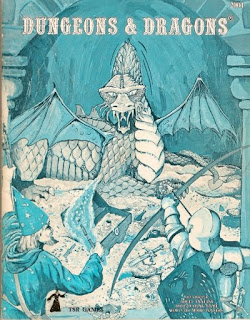
A friend of mine posted on his blog recently about his introduction to role-playing games. He mentioned specifically that when he was first starting out, one of the books he used was "Blue Set D&D rules."
I'm guessing he meant this, which was the booklet for Basic D&D. I bought this one in the summer of 1980, as part of a boxed set which also included some really crappy dice. They were not made from high-impact plastic, so they shed little plastic flakes all over the place. This was made worse because, when I joined my first gaming group (the Wargames Club at the University of Southern California), I didn't know from dice bags and carried my dice in an empty Blue Diamond almond jar. The dice rolling around against the hard glass made them flake much faster than normal, plus they stank. Within a couple of months, I got rid of jar and dice.
That was an exciting time to game, because role-playing was new, so lots of people were experimenting crazily. True, there were a lot of games that hewed pretty closely to Dungeons and Dragons' basic design philosophy, like Starships and Spacemen from Fantasy Games Unlimited, which felt almost as if they'd taken the Basic D&D Rules and plugged in the word "alien" whenever "monster" showed up in the original. Stats and combat were basically the same. Similarly, the original Villains and Vigilantes (also from FGU) felt very similar to D&D.
But there were other games coming out that were entirely different. Runequest from Chaosium took a very different approach to the issue of levels and skills. Traveller from Game Designers' Workshop was an attempt at a hard science fiction game that held the distinction of being the only game (as far as I know) that would kill off your character before you'd even finished creating him (I bought the books, tried rolling up a character, and by my third death, decided not to play it ever again). In Champions from Hero Games, you purchased your character from points rather than rolling statistics randomly; this made character creation a pain in the ass, but it could also be fun if you liked numbers, tweaking stats for hours to get a character that was powerful enough to survive and matched the conception in your head as closely as possible.
There have been three major gaming periods in my life. At USC, I gamed for about four years with a rowdy group, one of whom I still keep in touch with (and I wish I could track down some of the others). Some time after I came back to Oklahoma, I started gaming at a comic book shop in Oklahoma City, where I ran a brief but memorable Champions game, and also introduced the folks there to the joys and terrors of Steve Jackson's Illuminati.
I tried joining a D&D group when I moved to Tulsa, but it sucked; they handed me a pre-gen NPC, since they were in the middle of an adventure. The group was 4 thieves and a mage, and in the adventure, we were detectives searching for a stolen shipment of textiles. Seriously, it was dull as hell.
So I didn't game (other than occasional sit-ins here and there) for 20 years, until joining a group of friends here in Tulsa last year. Now gaming is fun again, although not as crazy exciting as it was almost 30 years ago, when the world was new, and bird and beast and flower were one with man, and death was but a dream. Also when there were a million new games with more every day, and we were itching to try them all, from Runequest (fantasy) to Bushido (feudal Japanese fantasy) to Boot Hill (Wild West) to Paranoia (sci-fi comedy) to The Morrow Project (post-apocalyptic doom).



No comments:
Post a Comment